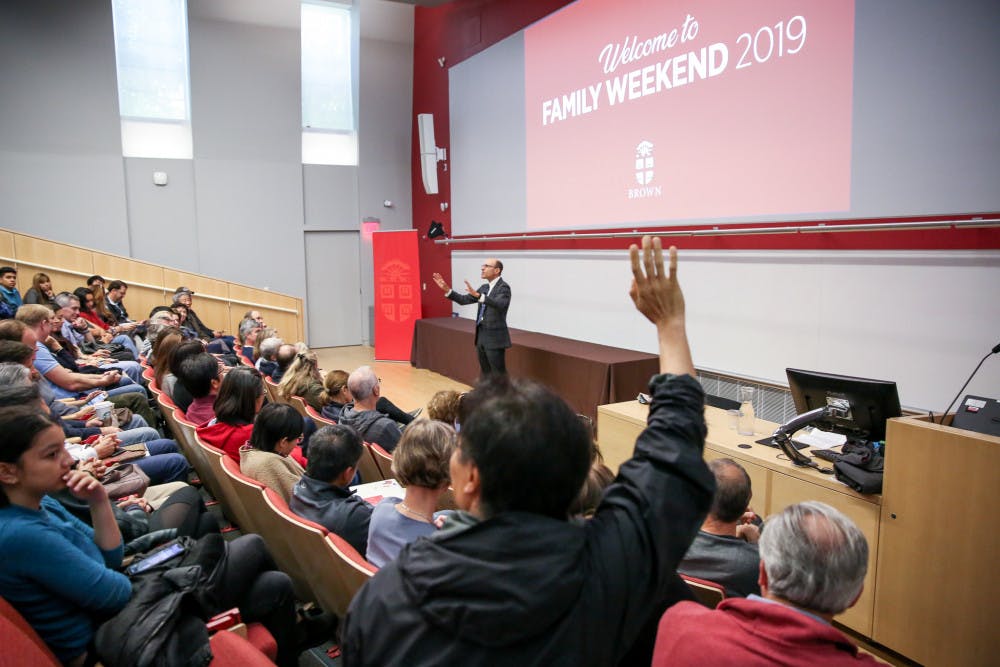At a Family Weekend Forum on the ongoing protests in Hong Kong, Director of the Watson Institute for International and Public Affairs Edward Steinfeld P’20 contextualized and offered his perspective on the events. His lecture, titled “Making Sense of Hong Kong’s Protests,” drew criticism from some audience members, who said his position was biased in favor of the Chinese Communist Party.
In June, protesters in Hong Kong took to the streets to challenge a proposed bill that would allow people accused of crimes to be extradited to China. Since the protests began, the interactions between protesters and police have become increasingly violent. The protesters adopted five demands for the Hong Kong government: withdraw the extradition bill; stop referring to the protests as a “riot”; drop charges against protesters; investigate Hong Kong police for their conduct during the protests; and implement universal suffrage independent from China. Hong Kong is currently a “special administrative region” of China that is governed under a “one country, two systems” policy, which allows Hong Kong to maintain its own economic and legal systems.
Steinfeld is the director of the University’s China Initiative, an “interdisciplinary hub for the study of modern China,” according to the Watson Institute’s website. He has published three books, his most recent entitled “Playing Our Game: Why China’s Rise Doesn’t Threaten the West.” He is also an academic board member of the Center for Industrial Development and Environmental Governance at China’s Tsinghua University.
He began the lecture by stating that ever since the May 4 protests in 1919, Hong Kong has been “wedged uncomfortably” between enlightenment and the conflicting tradition of nationalism. During the May 4 protests, students organized against their government’s decision to give up territory to Japan, beginning a rise in nationalist sentiment.
“In China, there’s been this juxtaposition between this focus on power and the state and hierarchy and order,” Steinfeld said. “At the same time, there is this different thread of almost wild freedom and liberation and openness and exploration.”
Steinfeld then explained Hong Kong’s transfer from British rule to Chinese rule in 1997. Hong Kong will be governed under China’s “one country, two systems” policy until 2047, after which its status is unknown.
In 1996, a year before the transfer, Steinfeld said “there was an unexpected feeling of hope” for the reintegration of Hong Kong into the larger Chinese nation. The handover “marked a new era,” with hopes that Hong Kong would “pave the way to a cosmopolitanism that the mainland would follow.”
According to Steinfeld, this sense of hope faded when mainland China underwent an “economic boom,” with Hong Kong losing some of its relative prominence within the national economy. Steinfeld believes this loss in prominence is one of three factors driving the current Hong Kong protests.
The second motivating factor, according to Steinfeld, is the belief held by many in Hong Kong that the Hong Kong government functions only to help the “local economic elite” who have aligned themselves with the Communist Party of China. Poor and middle-class citizens do not feel that their basic needs — such as public housing — are met.
The third motivating factor behind the protests is China’s regression “into a form of authoritarianism” under President Xi Jinping, Steinfeld said. China’s increase in surveillance and extra-judicial actions have worried people residing in Hong Kong.
Steinfeld chose to discuss this topic at Family Weekend because he felt the Hong Kong protests are “an important issue in contemporary global affairs” and that “the educational and scholarly work we do here at Brown provides important context for understanding the major societal issues of our time,” he wrote in an email to The Herald.
When Steinfeld opened the floor for a question and answer period, two attendees vocalized their issues with Steinfeld’s presentation of the motivating factors of the protest.
During the period, a Hong Kong-born alum accused Steinfeld of being biased because he felt that Steinfeld’s presentation included talking points of the Chinese Communist Party. For example, the alum said Steinfeld’s focus on economic factors as a reason behind the protests distracts from other motivating factors, such as a potential loss of democratic freedoms — a tactic used by the party. The alum also suggested that Steinfeld might be receiving funding from the United Front, a coalition of political parties led by the Communist Party. Steinfeld denied this allegation, but said that the alum’s criticism “does underscore the fact that there are huge differences of opinion and differences over the facts.” He also urged audience members to “take very seriously these points and read and decide for yourselves.”
This interaction was echoed by a graduate student, who stepped up to the microphone wearing a surgical mask and mirrored sunglasses to hide his identity. The student then said informational posters about the protests that were hung around campus had been taken down, and he asked Steinfeld for his position on their alleged removal. Steinfeld said he was not involved in the removing of the posters, nor does he support this process.
“It was important for the audience to see that there are many different views about what is taking place with the demonstration in Hong Kong today, and also about the history of Hong Kong,” Steinfeld wrote in an email to The Herald. “I thought it was equally important for the audience to see that at Brown, people are willing to listen to what a speaker has to say, and then voice their opposing or alternative views. That’s what learning is all about, including for the speaker.”





